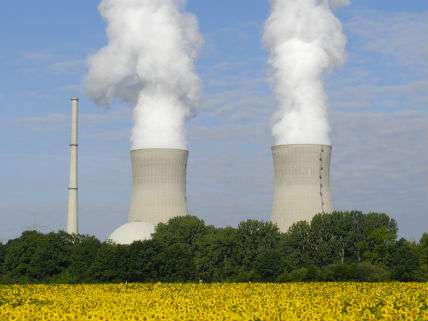The Nuclear War Over Climate Change
If global warming is a problem, it is idiotic for environmentalists to oppose nuclear power.

If you're concerned about climate change, it would be perverse to fight a technology that can supply copious quantities of no-carbon energy 24 hours a day—right? Well, when it comes to nuclear power, lots of leading environmental activists are indulging in just such perversion. For orthodox greens, the only untainted electrons are those jiggled free by sunlight or stirred by wind.
One battle in this intra-green war just played out in New York State this week. The good news is that the eco-modernist supporters of nuclear power were strong enough to win. The bad news is that the plan they were fighting for will lead to more government meddling in energy markets.
What happened? Unable to compete with heavily subsidized wind and solar power or electricity generated using cheap natural gas, the operators of four upstate New York nuclear reactors were planning to shut them down. Closing the plants would be a significant setback for Gov. Andrew Cuomo's ambitious plan to reduce the state's carbon dioxide emissions from the electric power sector. Currently the state gets 32 percent of its electricity from nuclear power, 19 percent from hydropower, 3 percent from wind, and 0.1 percent from solar. Burning natural gas currently generates about 41 percent of the state's electricity with the remainder from coal and oil.
In order to forestall these nuclear shut-downs, state regulators decided this week to subsidize nuclear power plants at a rate of $500 million per year. The deal was announced by the state's Public Service Commission when it adopted a plan to mandate that 50 percent of the state's electricity be produced using renewable energy by 2030. Under the new Clean Energy Standards, each nuclear plant will be allocated zero emissions credits, which utilities must purchase when buying power from them. It is estimated that the credits will sell for about $17.48 per megawatt-hour of electricity. That money will go to the bottom lines of the plant's owners, Entergy and Exelon. Now everybody's a subsidized rent-seeker.
The idea of subsidizing nuclear power plants sparked a furious round of recriminations among various environmental groups. For example, the Sierra Club opposed what it characterized as "massive ratepayer-funded subsidies to the nuclear power industry." The Alliance for a Green Economy organized a coalition of 112 activist groups, including Greenpeace, Food & Water Watch, Frack Action, and Upstate New York for Bernie Sanders, to sign an open letter arguing against the proposed nuclear subsidies.
Spearheading the pro-nuclear green campaign was a new group, Environmental Progress. Founded by eco-modernist Michael Shellenbeger, Environmental Progress, unlike most dogmatic green groups, fully understands that poverty is the biggest threat to the integrity of the natural world.
In its open letter to the Public Service Commission, Environmental Progress argued that the subsidies "embody a fair and equitable standard in treating nuclear power on a similar footing with other low-carbon sources." The letter added that the subsidies were "critical to safeguarding New York's low-carbon nuclear power, ensuring the security of the electricity supply, and meeting the state's decarbonization goals."
New York State's electric power sector currently emits 30 million tons of carbon dioxide annually. If the four upstate nuclear power plants were to be replaced by natural gas plants, the state's annual carbon dioxide emissions would jump by 15.5 million tons, a 50 percent increase.
The Environmental Progress letter was signed by several environmental heavy-hitters, including Whole Earth Catalog creator Stewart Brand, climate change crusader James Hansen, and a former president of the Missouri Botanical Garden, Peter Raven.
So why can't these plants compete without subsidies? Existing nuclear power plants are extraordinarily efficient, producing electricity at an average cost of $35.50 per megawatt-hour. (The average U.S. household consumes about 11 megawatt-hours in a year.) Due to low natural gas prices, wholesale electricity prices in the Northeast fell below $20 per megawatt-hour during some months in 2015.
In addition, nuclear power generators must compete with electricity produced by highly subsidized renewable energy sources. According one recent analysis, electricity generated by wind turbines costs $46 per megawatt-hour without the federal subsidy. But the U.S. government offers a production tax credit of $23 for every megawatt-hour produced, cutting the price in half. No wonder unsubsidized nuclear power plants are unprofitable. But instead of leveling the energy playing field, these activists want counter-subsidies! Assuming that the electricity from the upstate nuclear power plants goes for $35.50, the $17.50 zero emissions credit should cut the price essentially in half.
Let's step back from this fight for a moment and imagine that regulatory sanity somehow breaks out with respect to electricity generation. Could unsubsidized nuclear power compete with natural gas, coal, and renewable power? A study in Energy Policy earlier this year analyzing the electricity generation cost trends in seven different countries found that the steeply escalating cost trend for building nuclear power plants in the U.S. is, in large part, the result of excessive regulation. In other countries with more reasonable regulations, the increase in the cost of building nuclear power plants has been about the same as for coal-fired generation. With regard to competition from renewable power, the latest cost calculations from the Energy Information Administration finds that only unsubsidized wind power might be a bit lower than new nuclear generation by 2020.
In any case, the next battles in this intra-green war will be fought in Illinois, where operators are threatening to close three reactors, and in California, where anti-nuke environmentalists have extracted a promise from Pacific Gas & Electric that it will shutter its El Diablo nuclear plant. If man-made global warming is a problem, it is self-defeatingly idiotic for environmentalists to oppose nuclear power, a safe and reliable source of climate-friendly electricity. I just wish the nuke boosters would aim to roll back restrictions rather than adding yet more subsidies to the marketplace.
